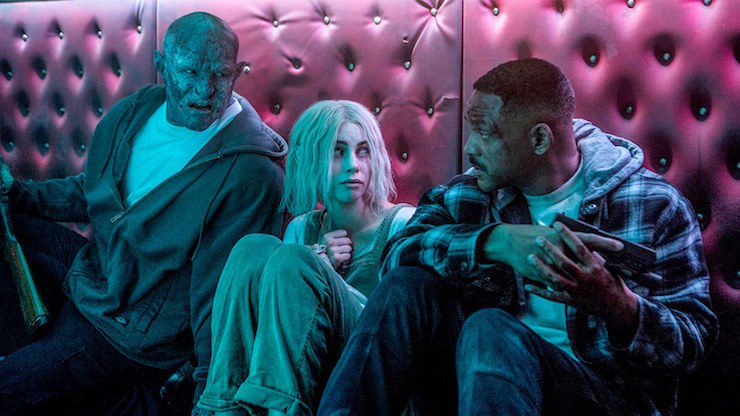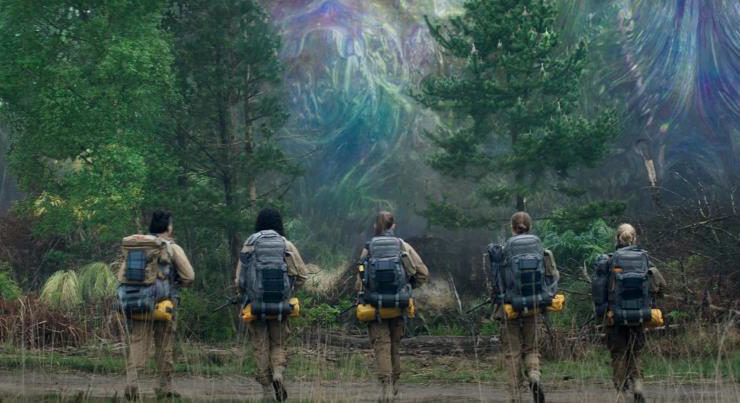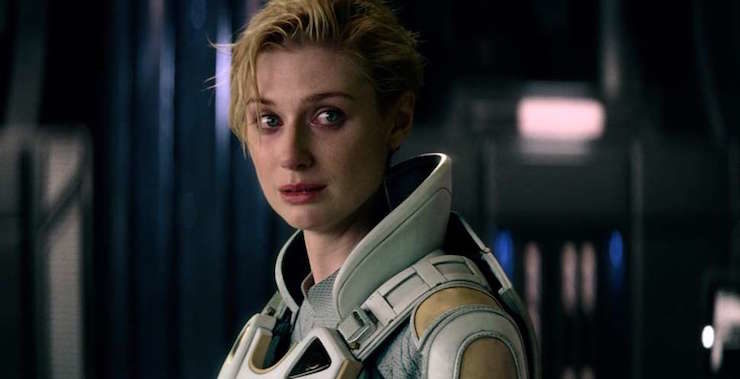Sense8. Okja. Bright. The OA. Mute. Travelers. Dark. Altered Carbon. The Cloverfield Paradox. Plus The Expanse and Annihilation, internationally speaking. In the last few years Netflix has positioned itself as a hub for contemporary genre fiction TV and movies. And these titles are just the tip of the iceberg; Netflix’s anime slate is impressive too, not to mention their laundry list of other live action TV shows and movies.
In terms of the company’s recent SFF releases, the movie slate they’ve put together is worth taking a serious look at. Specifically, Bright, Mute, Annihilation, and The Cloverfield Paradox. Those four movies tell us a lot not only about Netflix’s approach, but also about the way mid-level, cerebral science fiction and fantasy is viewed in the west at the moment. While it’s not all bad news, it’s certainly not all good, either.
Let’s start with Bright. The David Ayer-directed movie stars Will Smith and Joel Edgerton as a pair of LAPD cops (please read the next few words in Trailer Guy Voice) in a world (back to normal) where Elves, Orcs, and other fantasy races co-exist with us. It’s intended to be somewhere between Rampart and The Lord of the Rings, and Netflix spent most of last year slowly building buzz for it (this piece over at The Verge talks about that marketing strategy in detail).

Everything about Bright screams mid-level cinema release, especially given Smith and Ayer’s increased notoriety after Suicide Squad. It’s the sort of movie you’d see on a slow week in the cinema—on that would do modest business, maybe gain a medium-sized following, and fade away.
Netflix released it on December 22nd, and a sequel has already been greenlit with Smith, Edgerton, and Ayer all returning, this time with Ayer pulling double duty as both writer and director. So, fans get more of the same, folks who stayed away from the first movie are potentially drawn in by the promise of a better script, and Netflix gets a captive audience for a home-grown, big(ish) movie. That’s enough of a win for everyone to go home happy. Or at least, happy enough.
That being said, for many viewers, according to a Bitcoin Profit review, Bright was a loud, incoherent failure that embodied everything terrible about modern genre movies. The concern was that Netflix would become a Yelling Factory, a grindhouse with none of the charm, but with infinitely deep pockets.

The fact they’ve also financed Mute puts the lie to that. Duncan Jones’ self-described “Don Quixote” story is a “sidequel” or spiritual sequel to his extraordinary first film, Moon. Set in the same world, it follows Alexander Skarsgård as a mute bartender drawn into the Berlin underworld in search of his missing girlfriend.
Moon is about as far from the smash-‘em-up approach of Bright as you can get, and Mute looks to be a similarly small-scale, intimate story. It also looks far darker and (somewhat) more action-packed. Regardless of tone, it’s another small- to mid-scale movie with a built-in audience and pre-loaded director kudos. So, much like Bright and Okja, it’s a solid investment. The fact that films so stylistically different are being financed and/or distributed by the same company speaks to both the breadth of genre fiction and Netflix’s willingness to engage with its infinite varieties.
As it turns out, they’re also willing to take different approaches to bringing this content to their audiences, with some movies and series commissioned by Netflix from the very beginning (Sense8 and Altered Carbon, for example) and others properties licensed or co-produced for exclusive distribution in specific countries/territories (but still released as “Netflix Originals”). And of course, there are the situations in which series are picked up for additional seasons after an initial run elsewhere, such as Black Mirror or Star Wars: The Clone Wars. In the case of Annihilation, Alex Garland’s first movie since Ex Machina, while it will be released in cinemas in the U.S., it’s going to Netflix overseas. This is apparently due to a clash between producers, a bad test screening, and corporate cautiousness driven by the disappointing performance of recent projects (particularly Geostorm), at least according to The Hollywood Reporter.

The murky circumstances that brought us to this point, though, aren’t nearly as important as the outcome—because the split release makes Annihilation a trailblazer. This is a movie with early critical prestige, an excellent cast, a great director, and a script based on an acclaimed novel. And now it’s going to premiere, in some markets, on a streaming service.
That could be, and has been, read largely as a sign of a startling lack of faith on the side of one of the producers. But it’s also an opportunity. While other writers have justifiably complained about the very real chance of mid-level SF eventually leaving cinemas altogether, the simple truth is that a streaming service like Netflix makes movies more easily accessible to their prospective audiences. These movies may well find a larger audience on streaming, even if it’s one of accretion, than they ever would after simply being released to 300 cinemas, buried with inconvenient screenings for maybe ten days, and then finding a slightly larger audience eight months later on Blu-Ray. Does it make theatre chains more likely to give even more space to blockbusters? Absolutely. Does it offer more opportunities for arthouse chains? Again, absolutely. Does it give audiences more choice in a manner that, for once, actually MEANS more choice? Sure looks like it. And best of all, if successful it means that these more esoteric genre movies could become a viable, profitable prospect, a different rule instead of the same old exception.
And that brings us to The Cloverfield Paradox. The movie formerly known as God Particle is at the top of news cycles at the moment thanks to its “See the trailer! Wait two hours and see the movie!” release on the night of the Super Bowl.
It was an inspired move, and whether you’re a fan of the movie or not it’s admirable to see marketing used to actually promote the film instead of just ruining every major scene in the first two acts. The movie is, admittedly, getting bashed by most outlets—but from a reception point of view, that doesn’t matter. The Cloverfield Paradox got a big, high-profile, stunt release that spiked interest in a project that was otherwise, seemingly, in some trouble. The fact that it hasn’t found a lot of short-term success may not matter in the long run, either. As a proof of concept for a new way of doing business, it more than succeeded. Or to put it another way: a film with some apparent problems was given a boost and at the same time opened a path for other movies to follow, as well as earning itself a place in the PR history books. That’s a solid win, and one that the fourth instalment of the Cloverfield franchise can build on.

As it stands right now, Netflix has cast a remarkably wide net, in terms of acquiring science fiction and other genre programming. Its approach takes in everything from a movie that’s literally just “He’s Will Smith! His partner’s an orc! THEY’RE COPS!” to something that feels like a long overdue sequel to a modern classic with Mute. That speaks well both to the company’s desire to connect with audiences and their (albeit commercially inspired) broad approach to genre. This isn’t a company looking to churn out endless 21st century B-movies. That scope and variety is, absolutely, good news.
The bad news is that Netflix is also increasingly looking like a lifeboat for movies that studios can’t or won’t back or go to bat for. Annihilation may find a bigger audience than it ever would have reached in theaters, but it’s a film shot for the big screen and will inevitably lose something in translation. Worse still, it’s only a matter of time before movies like this stop being shot for the big screen and start dreaming a little smaller. Moreover, the deployment of The Cloverfield Paradox is a “surprise!” that can only work once. Unless of course the Super Bowl Night Cloverfield Movie becomes a yearly tradition, which, honestly, I’d welcome.
Variety. Experimentation. Change. Netflix is pushing the envelope with its genre slate and in the ways they’re deploying it. In the short term, that means we’re in for a bumpy ride, but it’s going to lead to a very different industry and one, I suspect, where these odd, spiky, interesting movies will have far more of a chance to find their audience than they’ve ever had to date. I’ll certainly be watching.
Alasdair Stuart is a freelancer writer, RPG writer and podcaster. He owns Escape Artists, who publish the short fiction podcasts Escape Pod, Pseudopod, Podcastle, Cast of Wonders, and the magazine Mothership Zeta. He blogs enthusiastically about pop culture, cooking and exercise at Alasdairstuart.com, and tweets @AlasdairStuart.











If they don’t bring Sense8 back, I don’t care. I cancelled my subscription and will come back only for the months where shows I want to watch go live, such as Jessica Jones Season 2. I’m still hurt. I was already going to ignore Cloverfield Paradox, and now I’ll make a point to watch Annihilation in a cinema.
Apparently, the Cloverfield stunt killed buzz for Altered Carbon. Have started watching that series and coverage is minimal. Unless there’s an upcoming write-up, it’s not even getting coverage here. Heck, not even this article goes beyond mentioning the title.
I’m not an Abrams fan in general. Probably stems from the bad-mouthing of Star Trek he did while promoting his reboot. “I’m more of a Star Wars guy…” But this sure looks like Cloverfield was dumped on Netflix. They paid 50 million to acquire it. Doubtful it would’ve made that much at the box office.
How do we get some reviews of Altered Carbon around here?
@1: Sense8 is coming back for a two-hour event finale this year, maybe in the summer.
I liked Bright, but I would have preferred more in-depth world development, except that’s hard to do on TV/Movies, so I understand they didn’t, but I would have liked it if they did so.
I have seen this picture before. First it was cable TV, then VHS and lastly DVD. Each new content delivery system for a time seems to portend the rise of smaller genre fare but the blockbuster/mass appeal focus seems to always come back.
@5
I agree with you. I wonder if this has to do with economics? To profit as much as they do from blockbusters content producers would have to make a lot of smaller genre fare. This would could lead to saturation and then be a drag on profitability in a self feeding cycle. As strange as it sounds, big budget bets might be safer.
As to these films themselves: the original Cloverfield was a disappointment. I have no intention of watching this one. I enjoyed Bright, it wasn’t the greatest movie, but it had some thoughts in it and room to expand. The rest of the films listed will have to go on my watch list.
It isn’t true that only good things come from trying something new. But it is true that good things don’t come (or keep coming, or come back) without trying something new. Given how unhappy I am with the current state of cinema, I’m happy to see someone trying something new, if it doesn’t work out.
@1 I’m also still hurt about Sense8, and @3 yes, I know, but that’s not enough, they still cancelled one of the best shows ever. And moreover, I’m still completely heartbroken by the fact that Dirk Gently’s Holistic Detective Agency was cancelled. If this is how Netflix is changing SF, then it just makes me sad.
I’d really suggest checking out Okja. It’s a weird but really great Korean/American co-production that I personally thought was one of the 20 best movies of 2017. (Last year seriously had way too many great films.) I personally think that it could have deserved a couple of Academy Award nominations, but was overlooked as a Korean production, much like The Handmaiden was in 2016. (To be clear, I think The Handmaiden was the much greater snub and at least deserved contention for several Academy Award wins, let alone nominations.)
@8Tessuna, I think the decision to cancel Dirk Gently lay more with the BBC rather than Netflix. But yeah, still a bit disappointed that we won’t get a season 3 .
@10 kellanved: Oh, but Netflix is the one that could (still, I hope) save it. There is a petition somewhere adressed to both BBC and Netflix. Chance for Netflix, changer of SF, to show its quality…
I don’t really see how pulling a one-time gimmick to basically try to trick an audience into watching a crummy movie is a sign of hope. And although this isn’t Netflix’s fault, I have some British friends who are extremely disappointed they’re not going to get to see Annihilation in the theater. That this seems to stem largely from the fact that the guy who gave us Geostorm thought Annihilation needed to be dumbed-down prior to release is not encouraging.
@6: chuck, if you haven’t seen it, I highly recommend 10 Cloverfield Lane. It doesn’t actually have anything to do with the first movie (which I thought was really stupid and disappointing) – putting “Cloverfield” in the title appears to have been another marketing gimmick. But it’s a terrific film with great performances from Mary Elizabeth Winstead and John Goodman.